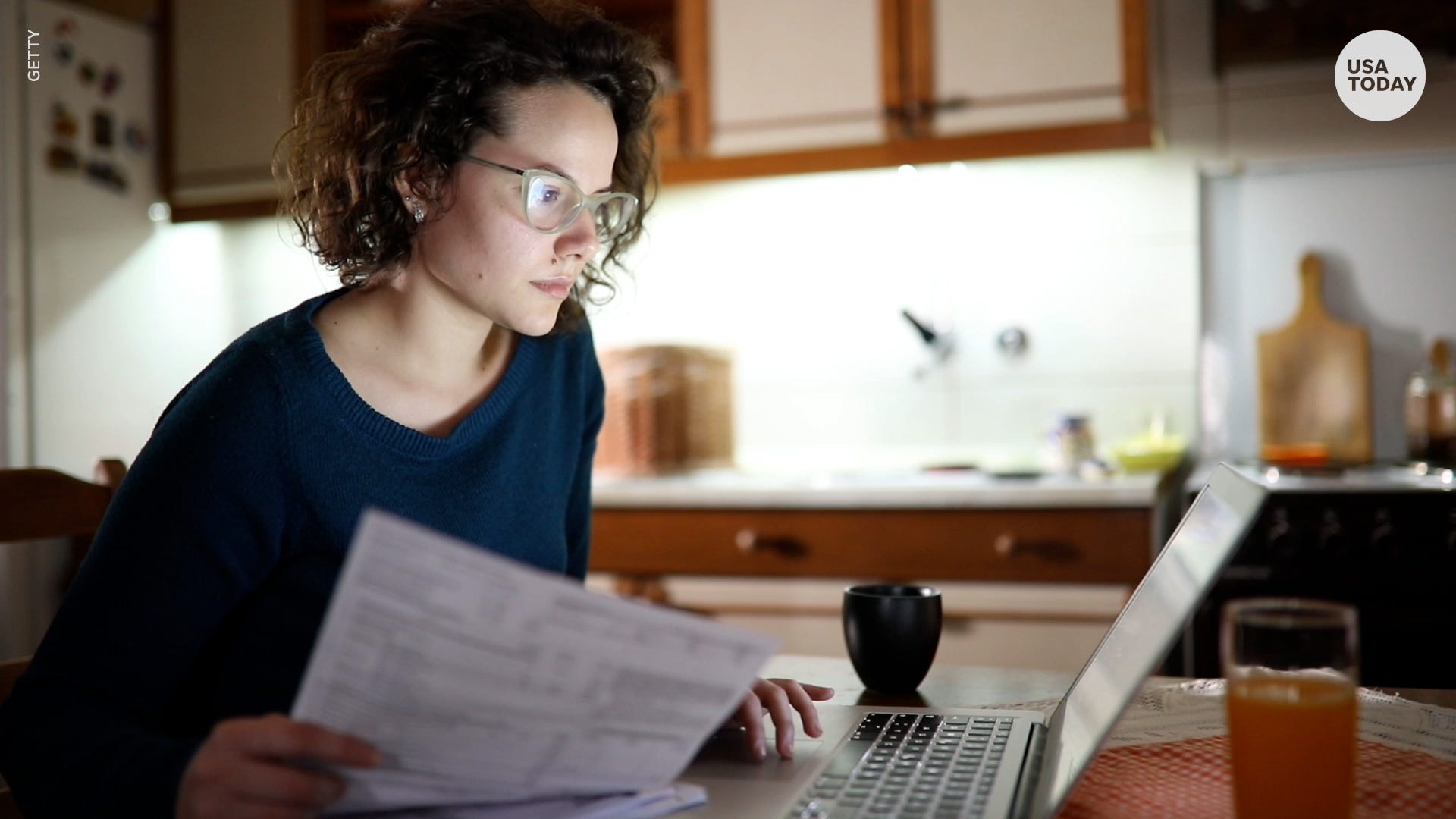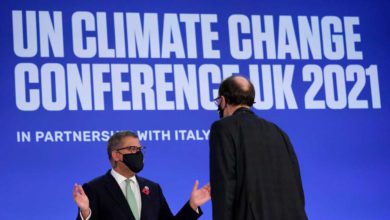

On today's episode of 5 Things: When the Public Service Loan Forgiveness program was created in 2007, it was supposed to be a pathway for people to get their federal student loans forgiven — if they went into a 'public service' job.
But the program's confusing eligibility requirements, like stipulations about payment schedules, meant the program was meaningless for most borrowers.
Now, President Biden's Department of Education says it will make it a lot easier to successfully access student debt forgiveness.
The Education Department announced earlier this month a vast overhaul to the loan forgiveness program that will erase the debt of 22,000 borrowers, totaling $1.7 billion. The government estimated another 27,000 borrowers could see about $2.8 billion in debts forgiven if they prove they were employed in an eligible job.
Shannon Green sits down with USA TODAY education reporter Chris Quintana to discuss who’s affected by the Department of Education's announcement and how they can be connected to loan forgiveness resources.
Hit play on the player above to hear the podcast and follow along with the transcript below. This transcript was automatically generated, and then edited for clarity in its current form. There may be some differences between the audio and the text.
Claire Thornton
Hey there, I'm Claire Thornton. And this is 5 Things. It's Sunday, October 17th. These Sunday episodes are special. We're bringing you more from in-depth stories you may have already heard.
Claire Thornton
$1.7 trillion and growing, that's collectively how much students in the US owe on their college loans. Progressive's have long called for relief for people burdened with student debt. One federal program initiated in 2007, that had promised forgiveness for loans but hadn't delivered. It's now getting an overhaul. Podcast producer Shannon Green, who you've heard on the show before, talked with USA TODAY education reporter Chris Quintana about the news. Here's that interview.
Shannon Green
The Department of Education has just announced sweeping changes for student loan forgiveness program. So I've asked Chris Quintana, our education enterprise reporter onto the podcast to explain what that means for folks who are eligible and why it's largely failed to erase eligible students debt so far. Chris, thank you so much for joining me.
Chris Quintana
Thanks for having me, I'm really excited to be here.
Shannon Green
Public Service Loan Forgiveness Program was created to incentivize students to become teachers, police officers, or take on other public sector work. But thousands upon thousands have applied for forgiveness and the federal government has rejected nearly all of them. Chris, what's going on? Why is that?
Chris Quintana
Yeah. This is kind of one of these well-intentioned government programs that just in reality hasn't worked as smoothly as one might hope. The idea behind public service loan forgiveness was pretty simple, right? You work for 10 years in the public sector. And after that time, whatever federal student debt you had left would be forgiven, but it came with all these caveats. So you had to have the right kind of loan and you had to be on the right sort of repayment plan. And if you were behind by like a day or two on a payment that wouldn't count towards the collective number of payments you had to reach to be eligible for forgiveness. So there were just a lot of pitfalls along the way for borrowers to try and access this relief. And part of the other problem was that it takes 10 years to be eligible for this program. It was instituted in 2007. So we didn't really know what the full scope of these problems were going to be until 2017. And that's kind of why we're starting to see it in full these days.
Shannon Green
Yeah. So it sounds like that has probably broken trust for a lot of people who would be eligible to apply for this. Talk to me about what the federal government is trying to do to let people know about these changes and make this new system clearer for people.
Chris Quintana
Yeah. So the federal government rolled out a bunch of changes to the Public Service Loan Forgiveness program recently. They had a big press conference and let a bunch of media know about it. And they also have got new landing portals on websites, letting people know kind of what this program is and what they might expect from it. But what it essentially does is it loosens some of their requirements that had been in place to take advantage of this program. So they're just saying that the only thing that matters at this point is if you were employed by an eligible employer. So you had to have worked in the public sector, but the federal government is being a little bit looser about, well, this federal loan wasn't technically eligible for the program, but we are going to accept it. Or you weren't technically on the right type of repayment plan but we're going to count this towards your overall forgiveness.
Chris Quintana
I would say the most important thing to remember right now is there is a time window attached to this. This is a temporary waiver. If students want to take advantage of this or if borrowers want to take advantage of this, they've got until about October 2022. And there's not really a ton that you need to do necessarily on your end to see if you qualify. You may have to go to past employers to certify that you worked in the public sector, but this is the sort of thing that you can look at and you don't really... There doesn't need to be at like a ton of resources in involved necessarily on your end. And I think that's the most important thing to remember at this point. The federal government may try to long-term codified this in law, but that's ultimately something that's up to Congress. And so if you want to benefit from this waiver, a year seems far away, but now's probably the time to act.
Shannon Green
So who exactly is eligible?
Chris Quintana
Yeah. So it's people who work in the public sector and that's a little hard to define sometimes. As the federal government states, it's people who work for public entities, we think police officers or firefighters or public school teachers. But that also includes people who work for nonprofits. So there might be someone like a tax attorney, who's taken out a lot of money to go to law school or it might be someone who works for the federal government as an analysis or something along those lines. So it's basically anyone in the public sector and maybe people who didn't realize that they were eligible for this program in the first place. Employers haven't done a great job of telling their employees that they qualify for this program.
Shannon Green
Have you spoken with anyone who does qualify?
Chris Quintana
Oh, yeah. I talked to borrowers all the time. And we've seen on social media, people are starting to realize that they may in fact be eligible for this increased forgiveness. They see like, oh, I had made a bunch of payments in these years and I was told that I wasn't eligible for them anymore. But if I'm looking at what the federal government has said or I'm looking at what I've read, I think I am eligible for this now. And there's sort of a kind of sense of, it's almost like they won the lottery. They were like, oh my God, like my loans may actually be forgiven. Which is, for a lot of these folks, they've gotten into grad school to pursue a master's degree or to do very specialized work that requires, frankly more debt. And so for them to be able to kind of get this opportunity when they thought that door was closed, it's been well received. The question will be if the federal government can actually forgive the debts.
Shannon Green
And I know in your story, you said that some people will immediately get relief. How do people find out like where they fall and how soon relief will come and if they can trust it?
Chris Quintana
Yeah. So their best bet is to go to the education department's website right now. That is, they can get information about what kind of loans they have if they're eligible and if they need to apply for a Public Service Loan Forgiveness. In some cases, if they had applied, they may need to apply again. If they have loans that aren't direct loans, which are loans directly given by the government, they may need to consolidate their loans into a direct loan. But you can get all that information by visiting the education department's website. As for when these these changes are going to be rolled out, we should get a better sense on kind of the timelines for forgiveness and in a few months or so. But there are about 22,000 borrowers right now who don't have to take any action, they've already made enough payments. They already have the correct amount of loans and the federal government just needs to properly count the payments according to the education department. And that relief will be automatic based on what they've told us.
Shannon Green
Chris, outside of this program for people in the public sector, what other programs exist for students who are looking to get relief on their loans?
Chris Quintana
Yeah, I would say for anyone looking for student loan relief, the education department has a lot of options available for people who have federal student loans. Now, this doesn't necessarily apply to folks with private student loans, there you have to contact your servicer directly there. But there are a lot of payment plans that tie what you have to pay on a loan to your income. There've been some criticism about these plans, whether or not they're ultimately making the loan more affordable or not but it may be a way to help borrowers get they're kind of heads above water if they need to. And just something important to remember with this Public Service Loan Forgiveness Program, this is like a temporary waiver that the federal government has introduced. So they've got about a year to apply for it.
Chris Quintana
So again, get yourself to the education department's website. If you have federal student loans, if you've worked in the public sector, maybe more eligible than you think. So that may be worth checking out. This is part of a wider effort by the Biden administration to provide student loan relief to people who are struggling to make these payments. Earlier this year, we saw the administration expand relief for borrowers who were like permanently disabled. We also saw them expand forgiveness for folks who attended predatory colleges that didn't bleed to credentials that employed that benefited their future job searches or closed on them while they were we're trying to get an education. So those are out there for folks that they kind of... These are programs that you sort of have to qualify into.
Chris Quintana
There's a little less that you can do to apply for, like in the Public Service Loan Forgiveness Program. But this is also part of this wider landscape of loan forgiveness right now. The Biden administration had talked about potentially forgiving up to $10,000 in student loan debt per borrower and kind of on the progressive side... A lot of progressive lawmakers have been pushing for a lot more than that. They're asking for $50,000 per borrower. It doesn't seem likely that that particular aspect of student loan forgiveness would happen. The Biden administration had asked the department of education to draft a memo on kind of the federal government's ability to forgive student loan debt in mass. There's been a lot of back and forth about whether or not that Congress or the federal government can do that. I'm still keeping an eye on that. And would like to see what happens with that particular memo as far as wider spread student loan relief goes.
Shannon Green
Chris, this has been really illuminating. Thank you so much for joining us today on the podcast.
Chris Quintana
Thanks for having me.
Claire Thornton
You can read more from Chris Quintana at the links I've included in the episode notes. We got two new reviews on Apple Podcasts. Lisa Graves said, "Quick and to the point. This podcast wraps up the day's events with an unbiased look at current news." And Sleepy Tank Girl wrote that 5 Things is "a nice summary in the morning." If you liked this episode of 5 Things, write us a review on Apple Podcasts and you'll get your own shout out on the show. I want to say thanks to Shannon Green for her help producing and this episode. Taylor Wilson will be back tomorrow morning with five things you need to know for Monday. Thanks for listening. I'm Claire Thornton, I'll see you next time.
Source link







